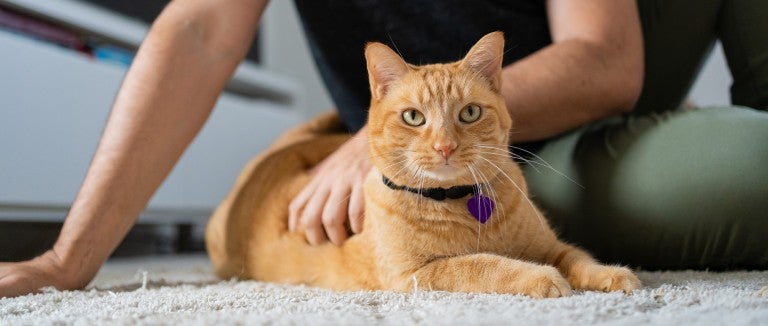Regular visits to the veterinarian are essential to keeping your cat healthy. You can keep tabs on how your cat is doing between vet visits with nose-to-tail checkups at home.
Get in the habit of running your hands all over your cat's body whenever they are cuddling with you or you're grooming them. This is the best way to discover problems before they become serious. Call your veterinarian if you find any that concerns you.
Do this easy cat health exam
1. Spend some time on your cat's skin
While petting your cat, feel for any lumps, scratches, scabs, swelling or any other irregularities. Dandruff and oily or missing fur can indicate skin or internal problems. Part the fur to look for fleas; specks that look like black pepper are actually "flea dirt" (flea feces that contain your cat's blood and turn red when wet). Keep an eye on any lumps, especially if they appear after a vaccination.
2. Examine your cat's ears
The hairless part of your cat's ears should be clean and odorless. If your cat is having problems, they may shake their head a lot and scratch their ears. Check for flaking, scabs, foul odor or discharge. If you see a black, gritty substance inside, they probably have ear mites, which are parasites that cause severe itching and are contagious to other cats.
3. Spy into your cat's eyes
Look for bright, clear evenly focused eyes. If you see redness, discoloration or discharge, squinting or the emergence of the third eyelid, your cat may have a problem that requires a call to your veterinarian.
4. Make time for your cat's mouth
Healthy gums are pink, pale or bright; red gums may mean something is wrong with your cat. Drooling and pawing at the mouth are cause for concern as well. Brown streaks and tartar build-up on the teeth may indicate a dental problem. If your cat's breath is so bad that you can't stand to have them near you, it's probably time for a veterinarian to take a look.
5. Don't be shy—get nose-y with your cat
A cat's nose should be clean. Depending on their activity level and the temperature of their surroundings, their nose may be cold or warm. If your cat paws at their nose or sneezes frequently, or if you see mucous or other discharge, contact your veterinarian.
6. Take a look under your cat's tail
Look under their tail. If you see what looks like grains of rice or spaghetti, you are looking at signs of parasites—some of which may be spread to you or other pets. Your vet can give you medication to rid your cat of these unwanted guests.
7. Focus on your cat's feet
Most cats don't like to have their feet touched. If yours doesn't mind, look for stuck-on litter, torn claws, cuts, swellings or infections. Also, check your cat's claws regularly to see if they need to be trimmed; untrimmed claws can inadvertently scratch you, get caught on carpet and furniture and grow into the paw.
Sign up to receive our exclusive e-book full of important information about caring for your pet, including training techniques and answers to frequently asked questions.

Post-exam pointers
Give your cat the brush-off
If your cat likes to be brushed, finish off your exam with a nice grooming session. Brushing is good for removing loose fur, distributing oils and stimulating blood flow. Brushing also helps prevent hairballs, which cats cough up after they've swallowed too much fur from grooming themselves or another cat in the household.
Don't self-medicate
Never give your cat any medication without your veterinarian's advice. Many human drugs—such as aspirin, acetaminophen (Tylenol), cold medicines, anti-cancer drugs, diet pills and anti-depressants—can poison cats. Even vitamins can be toxic.
When it comes to your cat's health, be book-smart
All owners should have at book on cat care (ask your veterinarian for a recommendation) that includes a section on emergency first aid. While you should never try to be your own veterinarian, you can learn some emergency procedures that could minimize damage and keep your pet relatively comfortable on the way to the veterinarian. Now is the time to educate yourself.
Put together a first-aid kit for your kitten
Always have a basic pet first-aid kit on hand, even when you are traveling with your cat. If something goes wrong, you'll be thankful you thought ahead, and so will your cat.

